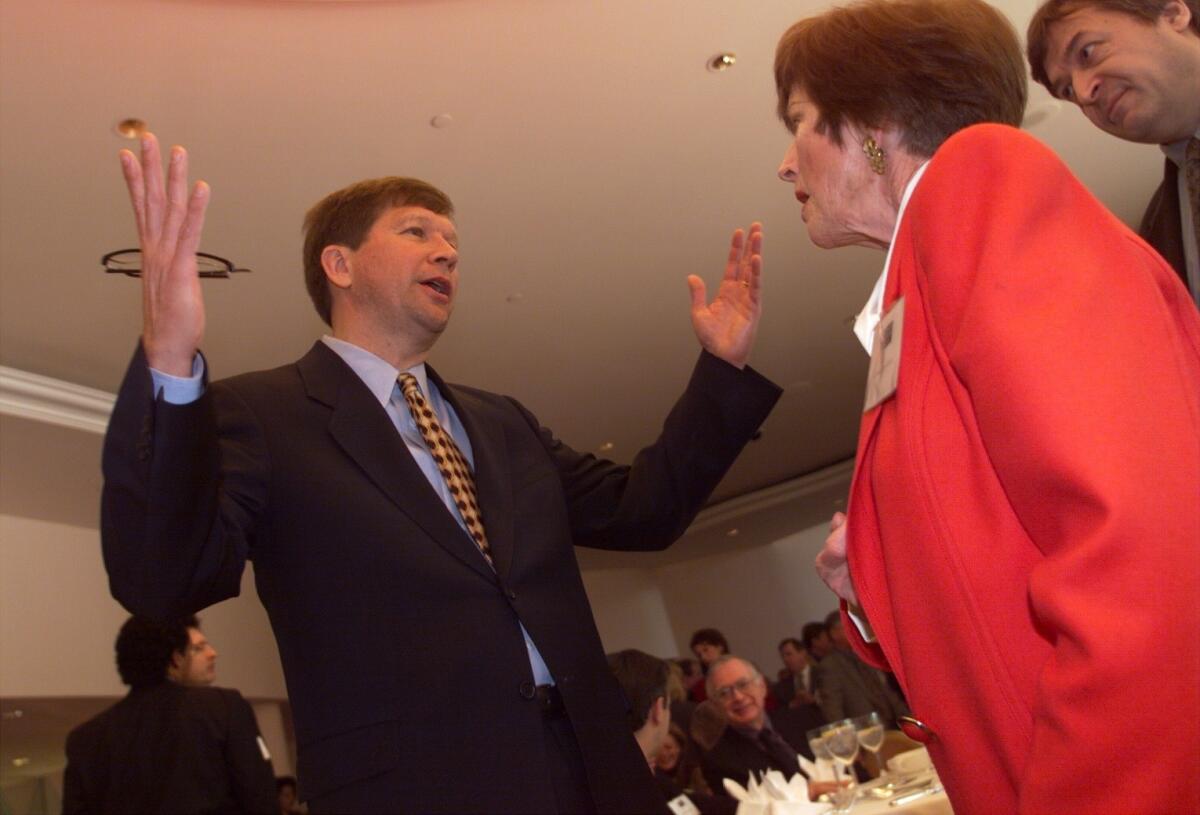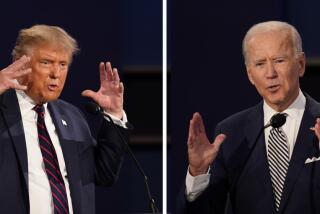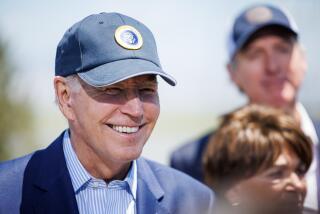From the Archives: John Kasich’s rat-a-tat-tat run for the White House

Rep. John R. Kasich talks to supporters in Beverly Hills of his presidential campaign in 1999.
In Iowa, he goes bowling. In New Hampshire, he mushes sled dogs. In California, where the purest form of political sport is raising cash, would-be U.S. president John R. Kasich is racing down a Los Angeles freeway, from one fund-raiser to the next, a rat-a-tat-tat torrent ricocheting from his lips.
The Republican congressman from Ohio hails the next car: “Turbo, baby, with a little Van Halen out of the speakers.” He ponders tomorrow’s speech: “We have to figure out what I’m going to talk about.”
TRAIL GUIDE: Get the latest news on the 2016 campaign >>
He is jousting over baseball’s best pitchers--”Koufax, he was all right. . . . Nolan Ryan just powered every game”--when Hollywood beckons.
“Where’s the Palladium? Look! There’s Capitol Records! Where’s the Hollywood Bowl? What is it?” he asks, pointing to a freeway sign before the cliff-hanging homes on the hills above catch his eye. “Who lives up there?”
He shifts in the front passenger seat, having long ago escaped the confines of his seat belt, and beckons his driver like a mock-tourist.
Boyish Demeanor and Budget-Cutting Verve
“We wanna see some stars, Chris,” he cajoles. “I’m not leaving California till we see some stars!”
This is a stream-of-consciousness campaign for the presidency, a verbal juggernaut in which policy pronouncements, social observations and anecdotal non sequiturs merge into a buoyant, if somewhat seat-of-the-pants, effort to take the country by a storm.
At the center of it all is 16-year congressional veteran Kasich, a politician best known previously for his boyish demeanor and a budget-cutting verve that occasionally ticked off his party leaders, now trying to transfuse his enthusiasm for himself to the rest of America.
He is typical of most of the Republican field this year, candidates who with flurries of handshaking, fund-raising, phone calls and heavenward looks are hoping to position themselves as the alternative should the current front-runners, Texas Gov. George W. Bush and former Red Cross president Elizabeth Hanford Dole, stumble or decide they have other plans for 2000.
Theirs is a parallel universe, where self-confidence and a sense of destiny out-fuel logic and historical precedent, and Kasich, 46, has a full tank of both. The cities rush past as quickly as the days: five days in California, then Seattle, Columbus, Chicago, Milwaukee, Youngstown, Cincinnati, Miami, Vero Beach, all in a week.
Let others tut-tut about his longshot status. In a conclusion almost stunning in its un-Kasich-like brevity, he has this to say about the upcoming contest for president:
“It never happens the way people think it’s going to happen.”
The hard truth is, most of the time it does. Most of the time, the front-runner goes on to win the nomination and meet the other party’s front-runner--in this case, Democratic Vice President Al Gore. But things are a bit less predictable this year, given that Bush has never run as a national candidate and Dole’s presumed entrance into the race is still doubted by some analysts.
So opportunity is knocking for Kasich, and to some extent he has opened the door. Last week in Los Angeles, he announced that he had raised $1.3 million in the first three months of the year, well behind Bush but ahead of Dole and other lesser-known candidates.
His is not the cautious candidacy of Bush, who is waiting out the Texas legislative session in Austin before treading onto the campaign trail, nor of Dole, whose penchant for control has led her to quash almost all attempts by reporters to draw her out on issues.
Kasich’s is a full-tilt assault, refreshing for its lack of guile and lack of varnish, and his eagerness to gab about virtually anything. Which is not to say that it always makes sense.
Education, for example, has been grabbed by Kasich as a perfect demonstration of his “bottom up” philosophy that power now held by the federal government should be sent back to Joe and Jane Citizen. He wants “total school choice,” which would allow states to organize schools as they wish, even using tax money to send children to private schools. A free-market enthusiast, he envisions entrepreneurs setting up new schools and competing for students. What qualifications would the entrepreneurs have to have? “Minimal qualifications,” he says.
‘I Know What We Have Ain’t Working’
He has little patience for concerns that some of the neediest children could be left behind: “I don’t know what will come, but I know what we have ain’t working.”
More than issue stances, however, Kasich is selling himself: an optimistic, often ebullient baby boomer with a shock of brown hair forever falling across his forehead, who has spent 21 years in elective office and risen to head the House Budget Committee. “A proven record of not a bunch of gibberish but actually doing things,” as he puts it in a veiled criticism of some of his opponents. To set himself apart from the pack, Kasich has relentlessly pursued the television camera. He tapped maple trees in New Hampshire on the grounds that he hadn’t done it before. He took part in the dog-sled race because, well, it was there when a scheduled television appearance didn’t pan out. Bowling became his signature in Iowa after he ducked into an alley to blow off steam during a 25-minute gap in his schedule.
“Bowling--people don’t get it right,” he muses during an interview in Bel-Air, half-buried in a hotel bar’s cushy couch. “Bowling isn’t about bowling. In a way, it’s taking the measure of the man. You see somebody bowl, you learn a little about him.”
So the obvious question: How does he bowl?
“Terrible!” he chortles. “I said that if I become president I’d outlaw bowling. But then I got better.”
Lest it sound otherwise, this is no lark to Kasich, who takes great pride in his tenure in Congress.
“This is not some kind of David Letterman campaign,” he cautions, before relenting just a bit. “But there’s an element of it. There’s an element of newness, freshness to it, I think. I hope. Out in California, they don’t even know who I am. It’s a long road, so we have to keep it fresh.”
The long road can be rocky. After spending a day and a half in Los Angeles in private meetings with money men, he is front and center before about 130 conservatives at the Beverly Hills Hotel. His speech meanders out of focus. He criticizes the “systemic problem” in education without mentioning solutions.
He segues to retirement long enough to tout his theme--”We need to run this country from the bottom up”--but never offers specifics. He touches lightly on his proposed 10% tax cut but then characterizes the details as “mechanical things” secondary to the need to wrest power from the federal government.
He sharpens when answering questions from the audience and is downright pointed when he ends his two-hour appearance with a pitch for cash. Its frankness only underscores Kasich’s relative obscurity.
“The biggest challenge for me is to look in people’s eyes and say, ‘Give me a chance.’ The fact is, I need your help,” he says.
Publicly, Kasich insists that he will win the nomination, but he is realistic enough to know that he is not fully in control of his destiny. A few things utterly out of his control, such as other candidates tanking, are necessary for him to rise to the top of the heap. He readily admits that he has to do well in the first contests in Iowa and New Hampshire to have any chance of continuing the race. But he seems at this point to be having a darn good time.
“Somebody told me to watch the movie called ‘The Mission,’ with Robert DeNiro, where he goes to South America and at the end of the movie [they] kill him, OK? And I’m like, ‘Why did I watch this movie?’ ” He interrupts himself with a rueful grin.
“But the answer was, he had to go there and die so the next guy could have an impact,” Kasich continues. “That was his mission. So I don’t know where my mission ends, but this is my mission now.
“And it’s great!”
More to Read
Get the L.A. Times Politics newsletter
Deeply reported insights into legislation, politics and policy from Sacramento, Washington and beyond. In your inbox three times per week.
You may occasionally receive promotional content from the Los Angeles Times.







